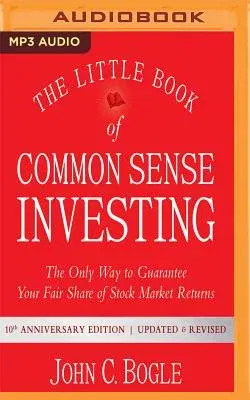The best-selling investing "bible" offers new information, new insights,
and new perspectives
The Little Book of Common Sense Investing is the classic guide to
getting smart about the market. Legendary mutual fund pioneer John C.
Bogle reveals his key to getting more out of investing: low-cost index
funds. Bogle describes the simplest and most effective investment
strategy for building wealth over the long term: buy and hold, at very
low cost, a mutual fund that tracks a broad stock market Index such as
the S&P 500.
While the stock market has tumbled and then soared since the first
edition of The Little Book of Common Sense Investing was published in
April 2007, Bogle's investment principles have endured and served
investors well. This tenth anniversary edition includes updated data and
new information but maintains the same long-term perspective as in its
predecessor. Bogle has also added two new chapters designed to provide
further guidance to investors: one on asset allocation, the other on
retirement investing.
A portfolio focused on index funds is the only investment that
effectively guarantees your fair share of stock market returns. This
strategy is favored by Warren Buffett, who said this about Bogle: "For
decades, Jack has urged investors to invest in ultra-low-cost index
funds.... Today, however, he has the satisfaction of knowing that he
helped millions of investors realize far better returns on their savings
than they otherwise would have earned. He is a hero to them and to me."
Bogle shows you how to make index investing work for you and help you
achieve your financial goals and finds support from some of the world's
best financial minds: not only Warren Buffett but Benjamin Graham, Paul
Samuelson, Burton Malkiel, Yale's David Swensen, Cliff Asness of AQR,
and many others.
This new edition of The Little Book of Common Sense Investing offers
you the same solid strategy as its predecessor for building your
financial future.
- Build a broadly diversified, low-cost portfolio without the risks of
individual stocks, manager selection, or sector rotation.
- Forget the fads and marketing hype, and focus on what works in the
real world.
- Understand that stock returns are generated by three sources (dividend
yield, earnings growth, and change in market valuation) in order to
establish rational expectations for stock returns over the coming
decade.
- Recognize that in the long run, business reality trumps market
expectations.
- Learn how to harness the magic of compounding returns while avoiding
the tyranny of compounding costs.
While index investing allows you to sit back and let the market do the
work for you, too many investors trade frantically, turning a winner's
game into a loser's game. The Little Book of Common Sense Investing is
a solid guidebook to your financial future.

